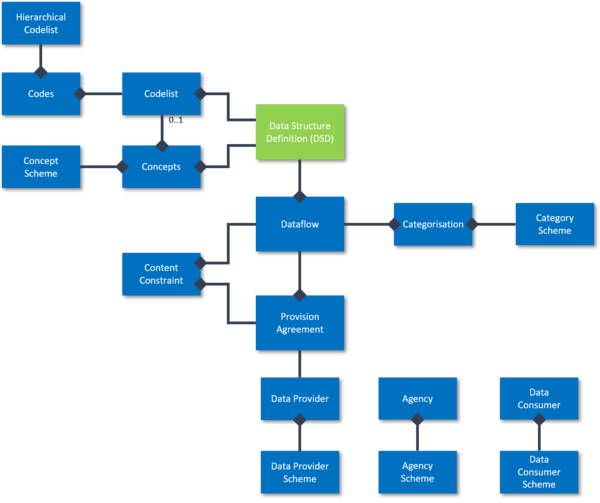Difference between revisions of "Data Structure Definition"
(→Usage) |
(→Usage) |
||
| Line 34: | Line 34: | ||
{| class="wikitable" | {| class="wikitable" | ||
|- | |- | ||
| − | ! | + | ! Component Type !! Component |
|- | |- | ||
| Dimension || Indicator | | Dimension || Indicator | ||
| Line 42: | Line 42: | ||
| Dimension || Frequency | | Dimension || Frequency | ||
|- | |- | ||
| − | | | + | | Dimension || Time Period |
|- | |- | ||
| Attribute || Unit Multiplier | | Attribute || Unit Multiplier | ||
Revision as of 01:46, 20 December 2019
Contents
Overview
An SDMX Data Structure Definition (DSD) describes the structure and dimensionality of a dataset in terms of its dimensions, attributes and measures.
Structure Properties
| Structure Type | Standard SDMX Structural Metadata Artefact |
|---|---|
| Maintainable | Yes |
| Identifiable | Yes |
| Item Scheme | No |
| SDMX Information Model Versions | 1.0, 2.0, 2.1 |
| Concept ID | DSD |
Context within the SDMX 2.1 Information Model
The schematic illustrates the Data Structure Definition artefact within the SDMX 2.1 Information Model
Usage
Data Structure Definitions (DSDs) are used to describe the structure of datasets by specifying their [[Dimension], Attribute and Measure Components. DSDs are reusable in that each can be used by multiple different Dataflows. This is useful where a number of different datasets need to be collected or disseminated that all share the same dimensionality and coding schemes.
Consider three datasets on the topics of Education, Health and Infrastructure. A simple DSD could be designed suitable for all three datasets
| Component Type | Component |
|---|---|
| Dimension | Indicator |
| Dimension | Reference Area |
| Dimension | Frequency |
| Dimension | Time Period |
| Attribute | Unit Multiplier |
| Attribute | Observation Status |
| Primary Measure | Observation Value |
